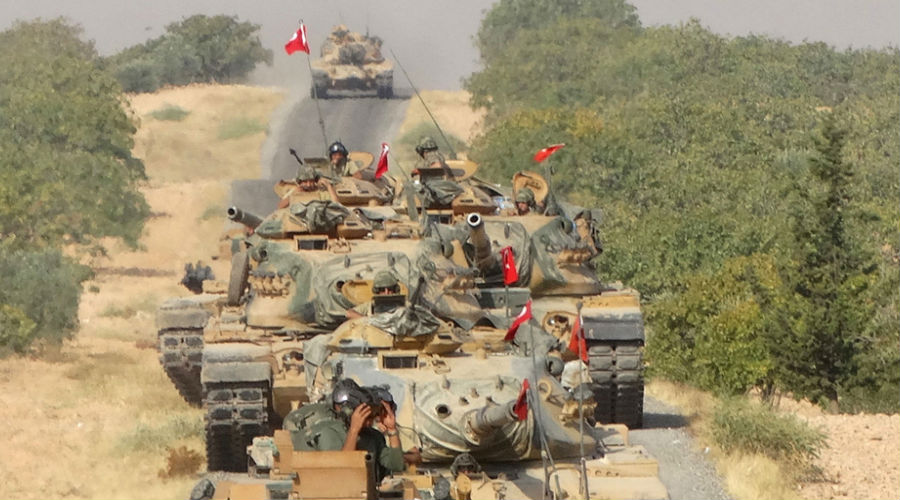Turkey announced seizing control of the Syrian city of Afrin on March 18, as part of Operation Olive Branch. The operation was launched to drive the Kurdish People Protection Units, or YPG, from the area and create a 30-kilometer deep "secure zone" in Syria. The development raised questions about the potential trajectories of the Turkish military intervention in Syria in the coming period. Such concerns are especially significant because various signs emerged that Turkey’s military operations are likely to continue and even expand to new areas, perhaps outside Syria. This coincided with ongoing talks between Turkey and the United States about settling the situation in Manbij City, where Ankara seeks to force out Kurdish militants. However, Ankara has not yet reached a comprehensive relevant agreement with Washington.
Potential Repercussions
Turkey insist on continuing military operations in Syria, despite strong criticism from some regional and international powers involved in the Syrian crisis. For instance, it became evident that such operations will contribute towards widening disagreement with European states, and Germany in particular. This was reflected in German Chancellor Angela Merkel’s criticism of Ankara, in statements delivered at the Bundestag lower house of parliament on March 21, where she said the Turkish intervention in Afrin was unacceptable, where thousands of people are being pursued, dying, or having to flee.
Turkey’s continued military operations in Syria, and perhaps their expansion to other countries such as Iraq, will impose several repercussions, of which the following stand out:
1- Rise in Asymmetrical Warfare: After Kurdish militias sent out messages that the capture of Afrin by Turkish forces’ and allied militias has ushered in a new stage of of the conflict between the two parties. They further indicated that this will push them to adopt a new strategy to deal with security and administrative arrangements that may be formulated in the coming period. The aforementioned strategy basically rests on hit-and-run tactics to inflict maximum losses on the Turkish forces and maximize the cost of their insistence on expansion from Afrin to other areas in Syrian territory.
2- Increasing Chances of Understandings between the Kurds and Assad Regime: Evident signs of this potential included a February 2018 agreement reached between the two sides allowing fighters from militias allied with the Assad regime to enter Afrin to help the Kurdish militias involved in armed confrontations with the Turkish forces. This prompted Turkey to warn the Assad regime that any attempt to back the Kurds would only prompt Ankara to continue its operations and expand them to other areas such as Manbij and eastern Euphrates.
In fact, recently clashes broke out between forces involved in Operation Olive Branch and militias allied with the Assad regime on March 21 on lines of contact, especially in areas that lie between Afrin and the towns of Nubul and Zahra, which are controlled by the regular forces.
However, this does not negate the fact that the potential agreement reached between regime and the Kurds will be only provisional and temporary, especially because of several variables imposing limitations that cannot be easily overcome. The most prominent of which are the Kurds’ keen interest in not losing the continuous American support and potential armed clashes breaking out between the Assad regime and Kurds from time to time.
3- Escalating Tensions with Iraq: Although, Turkey deliberately indicated a possible joint military operation with Iraqi forces to drive the Kurdistan Workers' Party from Sijar, there are views that tension between the two sides is likely to escalate. This is attributed to the fact that Ankara opted for pursuing the same Syria policy and issued threats to Baghdad that it can conduct the military operation alone in case Baghdad fails to cooperate. This pushed Baghdad to reject this Turkish approach saying that the war on ISIS that gave Ankara an opportunity to launch military intervention is now over, and that the new realities do not allow previous mechanisms to be adopted.
Different Trajectories
Turkey does not appear to have a clear vision for post-Afrin arrangements, especially because of conflicting statements from Turkish officials. This poses three potential trajectories for the current military operation carried out by Turkey in Syria.
Firstly, the Turkish military presence in Afrin would continue, despite denials from a number of Turkish officials. That is, Ankara may rely on its keen interest in ensuring that Kurds will not return to the city as a justification of consolidating its permanent military deployment there.
A second trajectory would see troops temporarily stationed inside the city, while military operations in other areas continue against Kurdish militants along the border with Syria and Iraq.
Turkish Foreign Minister Mevlut Cavusoglu alluded to this potential approach on March 22, saying that Ankara will drive the Kurdish YPG militia away from the Syrian border, if it does not reach agreement with the Washington on a plan to remove the group from Manbij. This is particularly important because Washington has a special interest in this area not only because of its strong ties with the Kurdish militias, but also because of its own military presence there.
The third potential trajectory would be that militias loyal to Ankara would form a local administration for Afrin to absorb pressures on Ankara over its military operation that can reshuffle cards and confuse the calculations of powers involved in the conflict, especially the United States, Russia and Iran.
Overall, it can possibly be argued that Turkey’s military intervention would further complicate the situation in northern Syria. It will further lead to reshaping patterns of interaction between local, regional and international powers involved in the crisis in Syria, as part of preparations for upcoming political and military liabilities.


